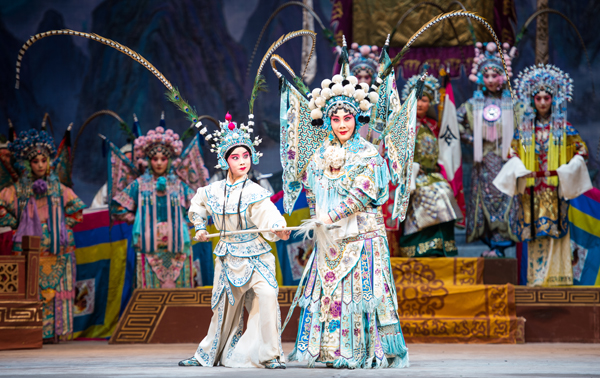House of Mei a legacy of Peking Opera
Updated: 2016-04-29 07:58
By Thorsten J. Pat Tberg(China Daily)
|
||||||||
 |
|
Women Generals of the Yang Family, a classical piece from the Peking opera repertoire, is coming to New York. [Provided to China Daily] |
The "Mei dynasty" of Peking Opera has come to an end. The heir to China's best-known opera clan, Mei Baojiu, died in hospital on Monday morning. The 82-year-old Mei was the youngest son of Mei Lanfang, China's legendary opera artist. Both father and son played Dan, or female roles.
As head of the Mei Lanfang Peking Opera Troupe, Mei Baojiu trained the next generations of artists and during his 70 years on stage, took 70 disciples. Mei Baojiu was married to Lin Liyuan, but the couple has no children. His older sister, Mei Baoyue, also a gifted opera artist, played mostly Sheng, or male roles. And she, too, didn't leave behind any children. This means no descendant of Mei Lanfang is still with Peking Opera today.
Peking Opera, or Jingju, as it is called in Putonghua, has become a powerful trademark. Jing means capital, ju a stage play. The Mei family had always insisted that it's jing, not yang-from xiyang-meaning Western. It's Chinese culture that makes it distinct.
The term Peking Opera suggests there are other regional operas in China: hundreds of them. And even within Peking Opera there are different pai, or schools. The Mei Pai (Mei School) of Peking Opera, for example, is considered zhongyong, or moderate.
For Westerners, watching Chinese Opera can be sense-overwhelming at first: (Percussion instruments) Dang, dang, dang, dang, dang, dang ... Ding! Pause ... flamboyant costumes, a drunken concubine; Dan, powdered like a cake, starts the most exaggerated piercing speech-singsong you will ever hear! (More percussion and wooden clappers) Ching, ching, ching, ching ... Clack, clack ... clack! Everyone gazes at the public display to read what she's been saying. A male enters: 6-inch-high-heels, enormous facial expression, effortless walk, gestures rehearsed a million times.
In Chinese performing arts there's a saying: "Taishang yifenzhong, taixia shiniangong." It means that we only see this minute of 10 years of practice. Just because actors have to start young in opera, it does not mean opera is for the young. The Stiftung Oper in Berlin reports that the average opera-goer in Germany is 51 years old. The Metropolitan Opera in New York reports that its average visitor is 57 of age.
Mei Baojiu's father, whose parents and even grandparents were actors, too, rose to almost super-human fame in the 1930s and 1940s, in no small parts due to the foreign press, to the point when Mei Lanfang became synonymous with Peking Opera. However, only his youngest son from his second marriage, Mei Baojiu, followed into his father's footsteps, at the age of 10. The Mei family saga is more fascinating, perhaps, than the fictional Buddenbrooks (by Thomas Mann): add the cross-dressing male divas and the spectacular kitsch and klimbimof reenacting Ming and Qing dynasties' eccentricities.
Mei Baojiu, during his final 10 years, realized two things: First, the grand plays and the history of Peking Opera must be part of the national curriculum (done, since 2008). And second, Peking Opera must be brought, if subsidized (as opera is in Germany, say), to international audiences. It was named "Intangible Cultural Heritage" by the United Nations in 2010.
Indeed, at no time in its history has Peking Opera enjoyed more prestige: Performances are organized from New York to Tokyo, from Munich to Edinburgh. In fact, Chinese Opera is technically the biggest in the world: Germany has 80 opera ensembles, China 1,000.
If only the world spoke a little bit more Chinese.
The writer is a culturual critic and the author of the forthcoming book Knowledge is a Polyglo
- Mei Baojiu: A lifetime of promoting Peking Opera
- Peking Opera master Mei Baojiu dies at 82
- Peking Opera drama debuts in Taiwan
- Faust tale told with Peking Opera
- Peking Opera finds a colorful new canvas
- Children perform traditional Chinese Peking Opera
- Speaking out against war through Peking opera
- Chen Peisi sets new stage to Peking Opera story of '30s
- Global health entering new era: WHO chief
- Brazil's planning minister steps aside after recordings revelation
- Vietnam, US adopt joint statement on advancing comprehensive partnership
- European border closures 'inhumane': UN refugee agency
- Japan's foreign minister calls A-bombings extremely regrettable
- Fukushima impact unprecedented for oceans: US expert

 Stars of Lijiang River: Elderly brothers with white beards
Stars of Lijiang River: Elderly brothers with white beards
 Wealthy Chinese children paying money to learn British manners
Wealthy Chinese children paying money to learn British manners
 Military-style wedding: Fighter jets, grooms in dashing uniforms
Military-style wedding: Fighter jets, grooms in dashing uniforms
 Striking photos around the world: May 16 - May 22
Striking photos around the world: May 16 - May 22
 Robots help elderly in nursing home in east China
Robots help elderly in nursing home in east China
 Hanging in the air: Chongqing holds rescue drill
Hanging in the air: Chongqing holds rescue drill
 2.1-ton tofu finishes in two hours in central China
2.1-ton tofu finishes in two hours in central China
 Six things you may not know about Grain Buds
Six things you may not know about Grain Buds
Most Viewed
Editor's Picks

|

|

|

|

|

|
Today's Top News
Liang avoids jail in shooting death
China's finance minister addresses ratings downgrade
Duke alumni visit Chinese Embassy
Marriott unlikely to top Anbang offer for Starwood: Observers
Chinese biopharma debuts on Nasdaq
What ends Jeb Bush's White House hopes
Investigation for Nicolas's campaign
Will US-ASEAN meeting be good for region?
US Weekly

|

|







